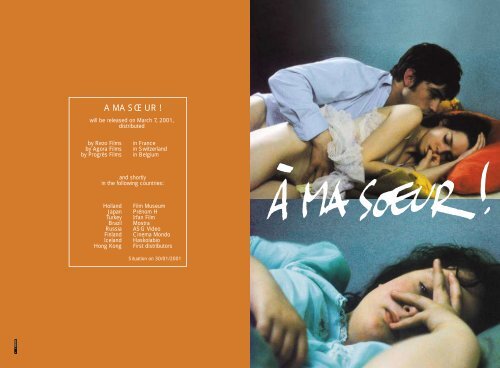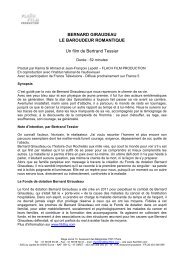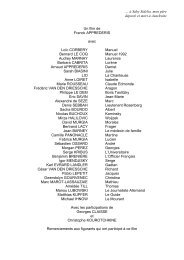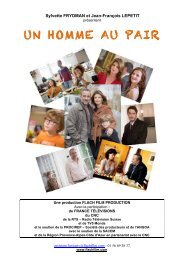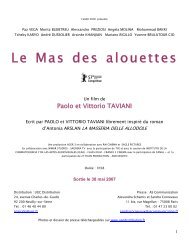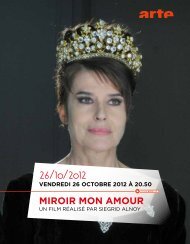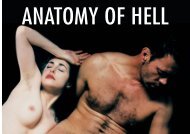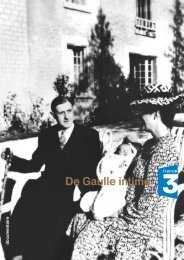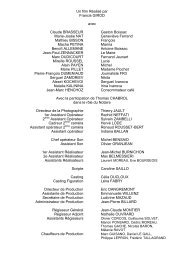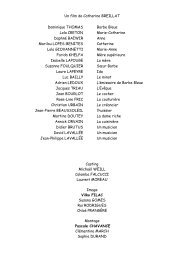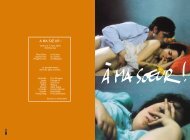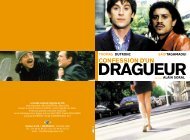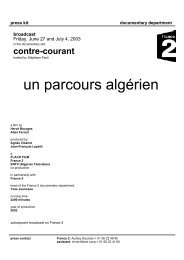TO MY SISTER ! Download press kit - Flach Film
TO MY SISTER ! Download press kit - Flach Film
TO MY SISTER ! Download press kit - Flach Film
You also want an ePaper? Increase the reach of your titles
YUMPU automatically turns print PDFs into web optimized ePapers that Google loves.
A MA SŒUR !<br />
will be released on March 7, 2001,<br />
distributed<br />
by Rezo <strong>Film</strong>s in France<br />
by Agora <strong>Film</strong>s in Switzerland<br />
by Progrès <strong>Film</strong>s in Belgium<br />
and shortly<br />
in the following countries:<br />
Holland <strong>Film</strong> Museum<br />
Japan Prénom H<br />
Turkey Irfan <strong>Film</strong><br />
Brazil Mostra<br />
Russia ASG Video<br />
Finland Cinema Mondo<br />
Iceland Haskolabio<br />
Hong Kong First distributors<br />
Situation on 30/01/2001
Jean-François Lepetit<br />
presents<br />
A film by<br />
Catherine Breillat<br />
Official selection Berlin 2001<br />
In competition<br />
Screenings:<br />
Official: February 10, 2001 at 4:30 pm at Berlinale-Palast<br />
Press: February 10, 2001 at 9:30 am at Berlinale-Palast<br />
(Followed by a <strong>press</strong> conference at the Berlinale-Palast <strong>press</strong> center)<br />
Additional screenings: February 11, 2001 at 9:30 am and at 11:30 pm at Royal Palast<br />
February 11, 2001 at 8:00 pm at International<br />
Running time: 93 min. / Format: 1.85 / Son: SRD<br />
a Franco-Italian co-production<br />
FLACH FILM - CB FILMS - ARTE FRANCE CINEMA<br />
IMMAGINE & CINEMA - URANIA PICTURES<br />
With the participation of Canal+<br />
and the Centre National de la Cinématographie<br />
www.amasoeur.com<br />
Distribution Press in Berlin<br />
Press<br />
Rezo <strong>Film</strong>s Brigitta Portier<br />
d.d.d. Conseil<br />
29, rue du Fbg Poissonnière Tel: +49 30 252 91477<br />
5, rue Robert-Estienne<br />
75009 Paris Fax: +49 30 252 91325<br />
75008 Paris<br />
Tel. : +33 1 42 46 96 10<br />
Fax. : +33 1 42 46 96 11<br />
Mobile phone: +32 477 982584<br />
E-Mail: brigittaportier@hotmail.com<br />
Tel. : +33 1 56 43 44 01<br />
Fax. : +33 1 44 95 75 47
is twelve and bears the<br />
weight of the world on her<br />
synopsisAnaïs<br />
shoulders. Her body is both the<br />
citadel for her pain and a fortress.<br />
Huddled up safely or forgotten by<br />
others, she is an observer.<br />
It’s summertime, by the sea, family<br />
holidays. Holiday love affairs. This<br />
is the apprenticeship of first love.<br />
Anaïs experiences it by proxy. She<br />
watches her older sister, Elena,<br />
whom she both loves and hates.<br />
Elena is fifteen and devilishly<br />
beautiful. Neither more futile, nor<br />
more stupid than her younger<br />
sister, she cannot understand that<br />
she is merely an object of desire.<br />
And, as such, she can only be<br />
taken. Or had. Indeed, this is the<br />
subject: a girl’s loss of virginity.<br />
And, that summer, it opens a door<br />
to tragedy.
interview with<br />
catherine<br />
breillat<br />
Where do the subject and characters of<br />
“A ma sœur” come from?<br />
For some years, I had had a news item in<br />
mind. What had struck me as much as the<br />
crime itself was the way in which the <strong>press</strong><br />
had related it. They were clearly attempting to<br />
give it a moral meaning to understand and<br />
accept it. I felt that such stories should be<br />
told differently. Then, one day, by a hotel<br />
swimming pool, I observed the following<br />
scene: a chubby adolescent girl was moving<br />
back and forth across the pool, talking to<br />
herself as if speaking words of love to<br />
imaginary boys. Her family and her older<br />
sister were there too. I started imaging a little<br />
girl like her in my news item.<br />
Strangely, I had never made a film dealing<br />
with the bond that can exist between two<br />
sisters, something that I myself have known<br />
through my own sister. I wanted to explore<br />
the total complicity that can co-exist<br />
alongside genuine ferocity. It became the<br />
fundamental subject of the film. The two<br />
sisters share their lives; the rest of the world<br />
barely exists and doesn’t enter into their<br />
relationship. The holiday affair is an obstacle<br />
to this demanding relationship that they have.<br />
In this film, you have also attempted to<br />
tell a story of the “first time”. How does<br />
A ma sœur ! fit in with your reflection on<br />
sexuality and its apprenticeship?<br />
The film also deals with the betrayal of<br />
romantic seduction. Elena is more romantic<br />
than her sister. She is seeking romantic love,<br />
which is normal at her age. Moreover, while<br />
Anaïs pretends not to be jealous, she’d<br />
nonetheless like to be in her shoes. There<br />
again, I don’t think there’s an apprenticeship.<br />
Experience proves that we make the same<br />
mistakes time and again, even if we<br />
occasionally do it with full knowledge of the<br />
facts. Elena doesn’t believe what the boy tells<br />
her simply because she is fifteen and naïve<br />
but because all she can do is believe it! The<br />
words that Elena takes to be promises only<br />
have their truth at that moment, in order to<br />
serve the boy’s opportunistic attitude. This<br />
doesn’t necessarily mean that they are lies<br />
and that’s why it’s so easy to believe them. He<br />
himself is sincere, even if his behaviour<br />
disproves what he says.<br />
Isn’t it hard to make young actors<br />
perform situations that they are likely<br />
to experience in real life? How to you<br />
manage to retain the fictional aspect?<br />
The film is inevitably affected by the human<br />
situations on the set. The most surprising<br />
thing is that Roxane and Anaïs really acted<br />
like sisters. The scene of their helpless<br />
laughter on the bed reflects what was really<br />
happening between them off camera: they<br />
truly had that kind of relationship without<br />
necessarily being sisters and despite their<br />
age difference. There again, films always<br />
generate odd behaviour... At first, I was<br />
worried that they wouldn’t get on, that they<br />
would be jealous of each other. But I think<br />
that they developed this amazing complicity<br />
in order to find some protection for<br />
themselves in relation to the film. It was a<br />
little like a refuge for them. There again, if<br />
Anaïs had been left out of it more, her<br />
character would have been entirely<br />
different.<br />
For some scenes, the shooting conditions<br />
weren’t easy. For example, they had to<br />
perform in swimsuits when the temperature<br />
was 4 degrees, bathe in very cold water:<br />
things that you can only do for a film! But, in<br />
my opinion, that’s peculiar to the cinema:<br />
you do things for a film that you’d never do
interview with catherine breillat<br />
in real life. And, even though this is painful<br />
and hard at times, I believe it is also<br />
exalting. Moreover, I have noticed that when<br />
an actor is confronted with something difficult<br />
to do, it’s the thing he does with the most<br />
ease! That’s what’s so exciting in this<br />
business.<br />
As Elena discovers the male body,<br />
Anaïs withdraws into herself, into her<br />
plumpness, in a form of self eroticism...<br />
Yes, because deep down, Anaïs is convinced<br />
that she is the better of the two. There’s<br />
always a rivalry between sisters and Anaïs<br />
fights back with the weapons at her disposal.<br />
But, deep down, she exists more than her<br />
sister does. Elena’s personality has already<br />
been slightly distorted by the idea of being a<br />
young girl of her age and her time. Because<br />
of her desire to please, she isn’t completely<br />
herself. She is beautiful, she is loved, she is<br />
fulfilled: but, deep down, this psychological<br />
comfort prevents her from finding herself.<br />
She simply has to conform to the norm that<br />
she corresponds to.<br />
Anaïs resists better. She absorbs the world<br />
while her sister, on the contrary, is absorbed.<br />
Moreover, Anaïs is very comfortable with her<br />
body, feels at ease. Hers is not an autistic,<br />
self-destructive form of obesity but an obesity<br />
that is made to conquer the world. I find her<br />
body very beautiful; it’s a baby’s body yet, at<br />
the same time, it is very erotic. The problem<br />
was that her body had changed between<br />
casting and the end of the shoot. I didn’t want<br />
her to be too developed with too much of a<br />
bosom: but, in the end, when I saw her in her<br />
swimsuit, I realised that she truly had a<br />
“forbidden body”, a blend of a little girl’s body<br />
and, at the same time, an incredible sexual<br />
opulence.<br />
At some points in the film, the two<br />
sisters seem to act like a single<br />
character...<br />
I viewed them as a “soul with two bodies”.<br />
This is the syndrome of sisters who have<br />
trouble finding their own identity. The one<br />
feels what the other does. In a way, she lives<br />
it just as much and it becomes part of her<br />
experience. They are not separated, even if<br />
the older sister tries to break away; she is<br />
always dependent on the way the other sees<br />
her. It’s a “fusional” and almost “confusional”<br />
relationship: moreover, in the real world,<br />
adults often mix up the first names of brothers<br />
and sisters. It’s a cursed love because one<br />
takes the place of the other, as when the<br />
mother slaps Anaïs instead of Elena.<br />
Moreover, the worlds of the parents and<br />
the children never communicate.<br />
For these two sisters, their father is their first<br />
disappointing male. He can only take care of<br />
his daughters on a material level. He has no<br />
opinion of them, he doesn’t even try to<br />
understand them and yet he believes that he<br />
takes care of them. No communication is<br />
possible with his children, or with his wife. For<br />
him, only the image counts, the signs of<br />
happiness: the house, the holidays, the family.<br />
The parents simply follow an idea of what<br />
they believe their duty to be. Although the<br />
mother may punish the girls by interrupting<br />
their holiday, she doesn’t know how to react,<br />
deep down. On a sexual level, I believe that<br />
one can’t wield any authority and that it’s<br />
stupid to make guilt so important. Moreover,<br />
the parents probably didn’t behave any better<br />
in their youth and even in their adulthood they<br />
have perhaps been just as irresponsible. I<br />
liked the idea that the film should descend<br />
towards crime and horror even, because of<br />
this error of judgement.<br />
Were the songs that Anaïs sings written<br />
for the film?<br />
No, they’re songs that I wrote as an<br />
adolescent. I originally wanted her to sing a<br />
song by Laura Betti. As a girl, I had been
interview with catherine breillat<br />
marked by her extremely provocative<br />
positions as an actress and a singer. I didn’t<br />
find the song I wanted but I came across the<br />
INA interview that you see in the film. So, I<br />
thought that Anaïs could sing the crow song<br />
that I had written when I was twelve or<br />
thirteen. It had been inspired by François<br />
Villon’s La ballade des pendus which has<br />
something very childlike and naïve in its<br />
darkness, while remaining a outstanding<br />
piece of work.<br />
I also needed a dash of tragedy. Originally,<br />
we were going to shoot in Sicily. The scene<br />
on the beach took place on Etna. The volcano<br />
provided a magical, dark, shadowy element.<br />
But the wild coastline that we shot on doesn’t<br />
leave such an intense im<strong>press</strong>ion as a<br />
volcano. I felt that these songs would bring in<br />
a tragic and sombre note through their<br />
obsession with death that I believe is inherent<br />
in adolescence. Anaïs is also trying to attract<br />
attention, for example, in the scene on the<br />
beach when Elena is behind a dune with the<br />
boy. At that point, Anaïs broods in a very<br />
romantic way; she has the attitude of a presuicidal<br />
child who says, “I may be dying<br />
because no one pays any attention to me.”<br />
This romanticising of death is, I think, a<br />
certain idea of life. The idea you have during<br />
adolescence. Deep down, it’s a matter of<br />
destroying the child within you. The problem<br />
is that you can easily destroy the child within<br />
you without necessarily becoming an adult!<br />
(laughter)<br />
Despite the subject matter, the film,<br />
although fairly explicit, is less “detailed”<br />
than Romance.<br />
The truth doesn’t necessarily lie in what you<br />
see. The image is a false witness. It’s always<br />
the meaning and im<strong>press</strong>ion given off by the<br />
whole film that makes you believe in what you<br />
see and feel that it’s important. Moreover, I<br />
didn’t want to cut myself off from a younger<br />
audience. The film’s crudity is very relative<br />
and I believe that it can even be instructive in<br />
some ways. There’s also a lightness, a<br />
“sitcom” aspect that I was aiming for. Indeed,<br />
the dialogue is transparent and very easy to<br />
understand. The whole romantic dialogue is a<br />
sitcom dialogue. Moreover, when you’re in<br />
love, you always speak a little like this and the<br />
only difference is that you believe it and that<br />
what you say involves you body and soul. But<br />
there’s also a comic effect, such as when<br />
they kiss while talking about what their<br />
fathers do. When you’re young, you always<br />
ask this kind of question when in fact you<br />
mean something else. This also exists in adult<br />
relationships, even if it remains outrageously<br />
adolescent in the film. Girls who set off<br />
looking for boys like that exist. And often<br />
these adolescents don’t even realise that<br />
they’re seducing each other when they meet<br />
and that’s what’s funny!<br />
The film abandons the portrait of<br />
adolescence to move towards the crime.<br />
How did you get the idea of this long<br />
sequence of the motorway journey?<br />
I have always been fascinated by these car<br />
journeys, on the road to the holidays, with<br />
the children in the back, lugged around like<br />
bodies who don’t have their word to say,<br />
with the parents smoking in the front. The<br />
scenery interested me too but only to the<br />
extent that it reflects a state of mind. This<br />
motorway is approached with anxiety and<br />
there is even a sort of “horizontal vertigo”. I<br />
wanted to describe this hallucinogenic and<br />
possibly psychotic aspect of the road and,<br />
at the same time, its hostility. The inside of<br />
a car is a confined world where people are<br />
close and, at the same, a long distance<br />
from each other. The girls weep and the<br />
mother, in the front, wants to see nothing,<br />
hear nothing and simply grips her wheel.<br />
She is entirely caught up in driving and<br />
cannot communicate. She doesn’t even<br />
give the im<strong>press</strong>ion of driving; she is<br />
“driven” by the road.<br />
Did you have a vision of the film’s whole<br />
structure from the outset?<br />
No, I needed to combine my sources of inspiration.<br />
But, in general, I discover my film in making it. That’s<br />
why I find it very hard to talk about the film’s<br />
screenplay before shooting. I refuse to bring to life<br />
just what I have written. If everything has been<br />
ex<strong>press</strong>ed, there’s no need to film it. The screenplay<br />
simply contains markers: I don’t understand what I<br />
want to say until I finish the film. That’s why I cannot<br />
censor myself. I’m afraid before shooting the<br />
scenes but I have to push that danger aside and<br />
ignore this fear, even if it is genuine. The fear of<br />
failure simply leads to failure. You think that you can<br />
biography<br />
<strong>Film</strong>s<br />
Une vraie jeune fille<br />
Tapage nocturne<br />
36 fillette<br />
Sale comme un ange<br />
À propos de Nice, la suite<br />
(Aux Niçois qui mal y pensent)<br />
Parfait Amour !<br />
Romance<br />
À ma sœur !<br />
Screenplays<br />
january 2001<br />
Catherine et compagnie... Michel Boisrond<br />
Bilitis David Hamilton<br />
La Peau (co-screenwriter) Liliana Cavani<br />
L'Araignée de satin (co-screenwriter)<br />
Jacques Baratier<br />
E la nave va (co-screenwriter)Federico Fellini<br />
Police Maurice Pialat<br />
Zanzibar (co-screenwriter) Christine Pascal<br />
Milan noir (co-screenwriter) Rony Chamah<br />
La Nuit de l'océan(co-screenwriter)<br />
Antoine Perset<br />
cling to experience and skill but these are things<br />
that can play tricks on you. A film must be fuelled by<br />
desire. One must not lose sight of the fact that<br />
there’s something mysterious about film creation:<br />
you go from a craftsman-like technique - the<br />
camera, the set, the lights - and at times end up with<br />
something magical. Fundamentally, a film set is a<br />
sacred place where you enter into a relationship<br />
with something very metaphysical. Silence and<br />
concentration attain almost religious levels. A<br />
director isn’t someone who gives orders but who<br />
puts people under the influence. But there’s no<br />
method to it, there are no rules: you don’t know how<br />
you do it, you even wonder what immaterial power<br />
makes you the filmmaker. This mystery is what<br />
amazes me the most.<br />
Aventure de Catherine C. (coscénariste)<br />
Pierre Beuchot<br />
La Thune Philippe Galland<br />
Le Diable au corps (téléfilm)<br />
Gérard Vergez<br />
Viens jouer dans la cour des grands<br />
Caroline Huppert<br />
Novels<br />
L'Homme facile Christian Bourgois<br />
Éditeur et 10/18<br />
reprinted by<br />
J'ai Lu 2001<br />
Le Silence, après... François Wimille<br />
éditeur<br />
Les Vêtements de mer (théâtre)<br />
François Wimille<br />
Éditeur<br />
Le Soupirail Guy Authier<br />
Éditeur<br />
Tapage nocturne Mercure de France<br />
Police Albin Michel et<br />
Éditions J’ai Lu<br />
36 fillette Carrère<br />
Le Livre du plaisir Éditions Numéro 1<br />
Une vraie jeune fille Éditions Denoël
im<strong>press</strong>ions<br />
anaïs reboux<br />
I met Catherine Breillat while she was casting the<br />
film. In the end, there were three of us left and<br />
Catherine had us read the screenplay in its<br />
entirety. Even if I found a few elements of myself<br />
in it, the character wasn’t really me. Anaïs is a<br />
little girl who doesn’t really want to live because<br />
her life is rather sinister. I think that she’s jealous<br />
of her sister, even if, deep down, she is more<br />
intelligent and more mature than Elena. She<br />
clearly understands what is happening to her<br />
sister who is fooled by the boy. She is in the<br />
position of an observer, which helps her<br />
understand more quickly. But she needs to have<br />
her life transformed. I think that what happens in<br />
the film will, in spite of everything, bring her out of<br />
her shell.<br />
During the shoot, everyone was very kind to me.<br />
They always tried to be close to me, to reassure<br />
me.<br />
roxane mesquida<br />
The screenplay for “A ma sœur” made a very<br />
strong im<strong>press</strong>ion on me. I read it during a<br />
free period at school and I was very unsettled<br />
by the story. I walked around school after in a<br />
very odd state... I could tell that there was<br />
something very interesting to perform in it. I<br />
had seen “Romance” and I felt that the film<br />
never became vulgar and, on the contrary,<br />
managed to show something very pure. “A<br />
ma sœur !” is a lot “softer” even if there are<br />
some fairly crude moments. My meeting with<br />
Catherine Breillat went very well, we<br />
immediately got on very well. On the set, she<br />
managed to inspire us to reveal surprising<br />
emotions. She would incite the actors to<br />
continually go further and we were overjoyed<br />
by that. Anaïs and I also had a great deal of<br />
It was a wonderful experience, I got on well with<br />
the other actors and Roxane and I have become<br />
friends. I don’t know if I’ll make other films, I don’t<br />
plan to force things. I’m still considering it.<br />
The hardest part for me was the scene when I get<br />
slapped. I had to start crying and I couldn’t do it!<br />
In the end, I called my mother, who pretended<br />
that my little dog had run off. I knew it wasn’t true<br />
but I acted as if it was and it worked.<br />
The first leading roles for Anaïs REBOUX<br />
and Roxane MESQUIDA, although the<br />
latter has been seen in supporting roles for<br />
Benoît JACQUOT in L’école de la chair and<br />
Manuel PRADAL in Marie Baie des Anges.<br />
complicity, which helped us a lot. As for the<br />
character of Elena, I must say that the part<br />
wasn’t an easy one. She could come across<br />
as being a superficial and naïve girl who gets<br />
fooled by a boy. She had to be given a certain<br />
depth. There were also some difficult things<br />
to perform that I had never done for a film. For<br />
the long love scene, Catherine took her time<br />
to make me comfortable. And, in the end, I<br />
have wonderful memories of the scene, my<br />
best day of shooting.<br />
I knew the world of Catherine Breillat well<br />
and we had already met.<br />
When she called me, I immediately gave my<br />
agreement before reading the screenplay,<br />
without trying to figure out what she had in<br />
mind in choosing me for the part.<br />
I told her that if she chose me as an actor, she<br />
did so at her own risk! This indifferent father,<br />
concerned by his own affairs, is a fairly<br />
unsympathetic character. I would make fun of<br />
Catherine, saying that she had only chosen<br />
me because Rocco Siffredi had disappointed<br />
her! (laughter)<br />
On the set, I tried to be at her complete<br />
disposal, to be totally available by forgetting<br />
that I too am a director. Even so, I was fairly<br />
worried about my own acting skills. Catherine<br />
is very demanding in her work, she is looking<br />
for something very precise which isn’t always<br />
easy to ex<strong>press</strong> but she searches continually.<br />
She cannot always provide the explanation,<br />
you simply have to move through the scene<br />
for things to become clear little by little.<br />
When Catherine Breillat asked me to be in<br />
the film, I had just about given up acting. I had<br />
seen “Romance”, which had caused quite a<br />
stir in Italy, “Tapage nocturne” and “36<br />
fillette”. On reading the screenplay for “A ma<br />
sœur !”, I felt that it was the best screenplay I<br />
had ever read. I immediately told Catherine<br />
who didn’t believe me! I came to France and<br />
I took intensive French lessons for a month to<br />
be able to say my lines properly.<br />
The character of Fernando embodies the<br />
cruelty of romantic relationships when they’re<br />
not equitable. He’s a Casanova on holiday,<br />
seeking above all an experience of physical<br />
love and is of course incapable of keeping<br />
the promises he makes. But, as an actor, I<br />
romain goupil<br />
I learnt a great deal about an actor’s work by<br />
finding myself on the other side of the<br />
camera, waiting for the least gesture or look<br />
from the directors. Moreover, the actors soon<br />
form a family. Here, totally naturally, the family<br />
of the film formed off camera too. But the film<br />
also awoke the fragility within us all. That’s<br />
why we were very close on the set.<br />
After working as an assistant director<br />
for Nelly Kaplan, Jacques Deray,<br />
Coluche, Chantal Akerman, Roman<br />
Polanski and Jean-Luc Godard among<br />
others, he directed several short films<br />
and, in 1982, presented his first feature,<br />
Mourir à trente ans, for which he was<br />
awarded the Caméra d’Or at the Cannes<br />
Festival and the César for Best First<br />
<strong>Film</strong> in 1983.<br />
His most recent film, A Mort la Mort,<br />
based on his novel of the same name,<br />
dates from 1998.<br />
couldn’t judge this character without risking<br />
losing him. I had to understand him differently<br />
than from a moral angle, as if, deep down, he<br />
represented the cruelty of nature within the<br />
context of a holiday affair.<br />
The work with Catherine and the whole crew<br />
went well and I soon felt part of the family.<br />
The nude scenes were no problem for me.<br />
The film deals with intimate, highly private<br />
moments but I wasn’t worried because I<br />
knew I wasn’t in a porn film. My personal<br />
relationship with Catherine was very good<br />
and there were a lot of experienced people<br />
on the crew. All this made the shoot a<br />
fascinating and very pleasant experience.<br />
A Ma Sœur ! by Catherine Breillat<br />
La via degli angeli by Pupi Avati<br />
Piu leggero non basta by B.Lodoli<br />
libero de rienzo<br />
Also a stage actor, he has taken part in<br />
a number of festivals (Festival della<br />
nuova drammaturgia italiana, Sentieri<br />
D’ascolto )
arsinée khanjian<br />
laura betti<br />
I first met Catherine Breillat in Toronto, when<br />
we had a long chat. I had seen a number of<br />
her films and I liked the way in which she<br />
tackled the prickly subject of sexuality without<br />
taboos or anxiety. When she called me a few<br />
months later, I had just seen “Romance”<br />
which had finally been released in Canada,<br />
amid all kinds of rumours. All the same, the<br />
film went way beyond the sensationalism that<br />
people tried to confine it to and it contained<br />
an approach to sex that was done with<br />
intelligence and original, well-thought-out<br />
ideas. When she asked me to be in “A ma<br />
sœur !”, I wasn’t at all scared because I had<br />
no ethical problems with her style of cinema.<br />
Catherine didn’t give me any indications<br />
about my character outside the frame of the<br />
film. It was only during the scenes and after<br />
shooting, that I realised who my character<br />
was. She’s a woman who submits to the<br />
<strong>press</strong>ures of a self-centred husband, and she<br />
is very vulnerable, probably too vulnerable to<br />
have any authority over her daughters. During<br />
the long drive back, on the motorway, we<br />
realise that she is totally helpless, that she’s<br />
incapable of acting in a responsible manner.<br />
This refusal to understand her daughter could<br />
even mean that she was subjected to similar<br />
<strong>press</strong>ures in her youth.<br />
On the set, Catherine concentrates on the<br />
essentials and doesn’t attempt to go into<br />
detail. She truly works with her actors; she<br />
doesn’t retreat behind the camera but<br />
remains physically very close to us. She is<br />
very attentive because she is looking for<br />
She launched her career as a singer at<br />
the end of the 1950s and made her<br />
stage debut under the direction of<br />
Luchino Visconti in Arthur Miller’s The<br />
Crucible.<br />
In the 1960s, she embarked upon her<br />
film career and became the muse of Pier<br />
something precise without really knowing<br />
what it is yet. She asked us to do some<br />
difficult things, such as the slap scene that<br />
we had to redo many times. Or perform in<br />
swimsuits at very low temperatures! But we<br />
were all ready to do it for the film. Catherine<br />
demands a great deal of truth from her<br />
actors. She makes no compromises because<br />
she knows that compromises are always<br />
visible on the screen.<br />
Actress and muse of the director Atom<br />
Egoyan in Next of kin, Exotica... or more<br />
recently Felicia’s Journey (part of the<br />
1999 Cannes Official Selection), Arsinée<br />
Khanjian has also worked with Olivier<br />
Assayas in Irma Vep and Fin août, début<br />
septembre, and appeared in Michael<br />
Hanecke’s film Code inconnu selected<br />
in competition for the 2000 Cannes<br />
Festival.<br />
She also performs on stage in Europe<br />
and Canada.<br />
Paolo Pasolini.<br />
Among others, she has worked with<br />
Federico Fellini, Roberto Rossellini,<br />
André Téchiné, Marco Bellocchio,<br />
Bernardo Bertolucci, Jacques Deray,<br />
Ettore Scola, the Taviani Brothers, Juan<br />
Bunuel...<br />
final credits<br />
a film by<br />
Catherine BREILLAT<br />
with<br />
Anaïs Anaïs REBOUX<br />
Elena Roxane MESQUIDA<br />
Fernando Libero DE RIENZO<br />
The mother Arsinée KHANJIAN<br />
The father Romain GOUPIL<br />
Fernando’s mother Laura BETTI<br />
The killer Albert GOLDBERG<br />
Friends at residence Odette BARRIERE<br />
Anne MATTHIJSSE<br />
Pierre RENVERSEAU<br />
Jean-Marc BOULANGER<br />
Waiter Frédérick BODIN<br />
Residence janitor Michel GUILLEMIN<br />
Saleswoman Josette CATHALAN<br />
Police officer Claude SESE<br />
Inspector Marc SAMUEL<br />
Assistant directors Michaël WEILL<br />
Fabrice BIGOT<br />
David SANTINI<br />
Editing Pascale CHAVANCE<br />
Gwenola HEAULME<br />
Frédéric BARBE<br />
Photography Yorgos ARVANITIS A.F.C.<br />
Olivier FORTIN<br />
Christophe LE CARO<br />
Sound Jean MINONDO<br />
Olivier VILLETTE<br />
Erwan KERZANET<br />
Sound editing Frédéric ATTAL<br />
Sylvain LASSEUR<br />
Mix Vincent ARNARDI<br />
Salim AMRANI<br />
Sets François Renaud LABARTHE<br />
Yann RICHARD<br />
Cécilia BLOM<br />
Fabienne DAVID<br />
Christophe GRAZIANI<br />
Fabrice HERAUD<br />
Gérald LEMAIRE<br />
Jean-Luc MOLLE
Make-up Claire MONNATTE<br />
Monique KAISER<br />
Hair Patrick PELOILLE<br />
Special effects make-up Dominique COLLADANT<br />
Fabien TUIZAT<br />
Continuity Séverine SIAUT<br />
Casting Michaël WEILL<br />
Gilles CANNATELLA<br />
Fabrice BIGOT<br />
Olivier CARBONE<br />
Nicolas LUBLIN<br />
Costumes Catherine MEILLAN<br />
Sanine SCHLUMBERGER<br />
Anne DUNSFORD VARENNE<br />
Janet LATIMER<br />
Steadycam Jacques MONGE<br />
Props Julien POI<strong>TO</strong>U WEBER<br />
Production manager FREDY LAGROST<br />
Production management Pierre CORDONNIER<br />
Eric AUFEVRE<br />
Jérôme ALBERTINI<br />
Fabrice JOLY<br />
Lysiane BIAGINI<br />
Michelle MASSEYEFF<br />
Sébastien COULET<br />
Arnaud BOUDET<br />
Marion GAILLARD<br />
Emmanuel RIGAUT<br />
Marc LENORMAND<br />
François STACKE<br />
Set construction Max Olivier DUCOUT<br />
Roger SAILLARD<br />
Pierre Eric YAKOVENKO<br />
Christian LIONEL<br />
Pascal GUYOT<br />
Painting Françoise MALAPLATE<br />
Marie CHAPUIS<br />
François HENNEQUIN<br />
Alexis JORAND<br />
Guy LIONEL<br />
Electricity Olivier REGENT<br />
Izet KUTLOVAC<br />
Lucilio DA COSTA<br />
Amar KABOUCHE<br />
Thierry ENGLER<br />
Manuel LOPES<br />
Dominique QUEROU<br />
Grips Yorgos ANGELOU<br />
Philippe ANDRON<br />
Philippe GRUNEBAUM<br />
Marcel BERTHOMIER<br />
Riggers Fabrice SEBILLE<br />
Alexandre PUTMAN<br />
Danilo RADASINOVIC<br />
Jean-Luc STAINCQ<br />
Pascal RODRIGUEZ<br />
Sébastien MEUNIER<br />
Sound effects Philippe PENOT<br />
Post-synchronisation Jean Max MORISE<br />
Title design Lionel KOPP<br />
Grading Jean-Marc GREJOIS<br />
Still photographers Hervé LAFONT<br />
Jonathan KRUGER<br />
Administration Marie-Agnes BROSSAUD<br />
Murielle CUSEY<br />
Marie Christine GAUCHEE<br />
Dominique FRIZAT<br />
Producer’s assistant Héléna MENDES<br />
Post-production Bernard BRUN<br />
Stunts Michel CARLIEZ<br />
Michel JULIENNE<br />
David JULIENNE<br />
Gaëlle COHEN<br />
Francis BATAILLE<br />
Gilbert BATAILLE<br />
Tracking car Michel NORMAN<br />
Police technical adviser Patrice GUILLAIN<br />
Educator Sophie BELLAVOINE<br />
Chiropractor Philippe MESTANIER<br />
Guitarists Fabrice NGUYEN THAI<br />
Jean-Paul JAMOT<br />
a film produced by<br />
Jean-François LEPETIT<br />
a Franco-Italian co-production<br />
FLACH FILM - CB FILMS - ARTE FRANCE CINEMA<br />
IMMAGINE & CINEMA - URANIA PICTURES<br />
With the participation of Canal+<br />
and the Centre National de la Cinématographie
Press agent<br />
d.d.d. Conseil<br />
Advertising and promotion<br />
ARGUMENTS<br />
Patricia BALES<br />
World sales<br />
<strong>Flach</strong> Pyramide International - FPI<br />
<strong>Flach</strong> <strong>Film</strong> web-site<br />
http://www.flachfilm.com<br />
Acknowledgements<br />
Marie LEBEE, Dominique ROCHETEAU, Jean-Michel PINSON<br />
Odette BARRIERE, Anne MATTHIJSSE<br />
Jean-Pierre BENAIS, Séverine SAGET<br />
Boris REBOUX, Nelly SEUGE, Marie-Hélène BREILLAT<br />
Chantal POUPAUD, Claire CLOUZOT<br />
Catherine and Jeanne RESSAIRE, Jacques CHATELAIN<br />
Richard BOIDIN, Georges GOLDENSTERN<br />
Pierre BENQUE, Christian BOURGOIS<br />
LES MAIRIES DE LES MATHES - PARC DE LA RESIDENCE DE LA PAL<strong>MY</strong>RE<br />
ST PALAIS SUR MER et ROYAN - LA PREFECTURE DE LA ROCHELLE<br />
LES GENDARMERIES DE LA TREMBLADE, ROCHEFORT et LA ROCHELLE<br />
LA DDE DE LA TREMBLADE - L’ONF DES MATHES ET DE LA TREMBLADE<br />
LA POLICE MUNICIPALE DE ST PALAIS SUR MER et ROYAN<br />
LA DDE DU VAL D’OISE - LE GROUPEMENT DE GENDARMERIE DU VAL D’OISE<br />
LA SANEF - LA PREFECTURE DU VAL D’OISE<br />
LA PREFECTURE DE L’OISE - SAPRR - GESMIN<br />
ETABLISSEMENTS BOSQUET - XEROX DOCUMENT S<strong>TO</strong>RE<br />
CASABLANCA - RENAULT - <strong>TO</strong>D’S<br />
CHŒUR DE FILLES CAECILIA DE SAINT CHIS<strong>TO</strong>PHE<br />
Shooting studio STUDIOS D’ARPAJON<br />
Laboratory GTC<br />
<strong>Film</strong> stock KODAK<br />
Cameras IRIS CAMERA<br />
Electric equipment LOCAFLASH<br />
Technical vehicles GROUPE TSF<br />
Sound equipment TAPAGES<br />
Rerecording DCA<br />
Auditorium AUDITEL<br />
Sound effects auditorium LES DAMES AUGUSTINES<br />
Post synchronisation STUDIO LINCOLN<br />
Opticals MICROFILMS<br />
Titles LUMIERE UNIQUE<br />
MICROFILMS<br />
Caterer GOUTILLE<br />
Insurance LES ASSURANCES CONTINENTALES<br />
Discorama Laura BETTI<br />
Hosted by François BARNOLLE<br />
Directed by Maurice BEUCHEY - 18/02/1962<br />
I.N.A - INSTITUT NATIONAL DE L’AUDIOVISUEL<br />
“ SOCIAL CLIMBER “<br />
Performed by Laura BETTI<br />
“ VENE CARNEVALE “<br />
Music by Luigi BALDUCCI<br />
Cataldo de PALMA and Francesco QUATELA<br />
Performed by TAVERNANOVA<br />
Published by Compagnia Nuova Indye and Jaune Citron (France)<br />
With the kind permission of Compagnia Nuova Indye<br />
“ MOI JE M’ENNUIE ”<br />
“ J’AI MIS MON COEUR A POURRIR ”<br />
Words and music by Catherine BREILLAT<br />
“ THE PRETTY THINGS ARE GOING <strong>TO</strong> HELL ”<br />
Performed by David BOWIE<br />
David Bowie / Gabrels Reeves<br />
© Nipple Music / Exploded View Music<br />
© David Bowie / Virgin Records America Inc.<br />
© <strong>Flach</strong> <strong>Film</strong> 2001<br />
<strong>Flach</strong> <strong>Film</strong> <strong>Flach</strong> Pyramide International<br />
12, rue Lincoln World Sales<br />
75008 Paris 5, rue Richepanse<br />
Phone: 33 1 56 69 38 38 75008 Paris<br />
Fax: 33 1 56 69 38 41 Phone: 33 1 42 96 02 20<br />
e-mail: flachfilm@flachfilm.com Fax: 33 1 40 20 05 51<br />
site: www.flachfilm.com e-mail: elagesse@flach-pyramide.com


